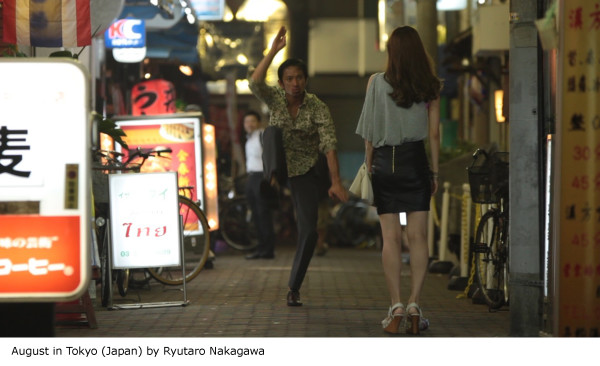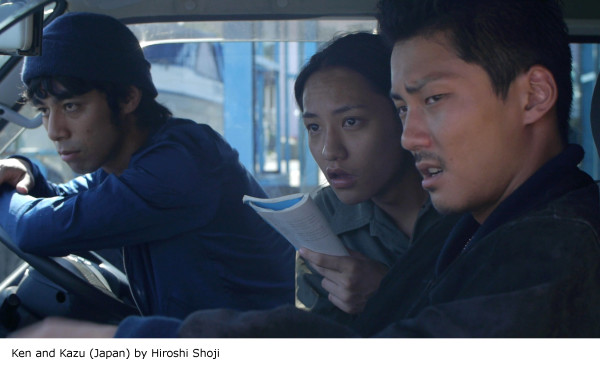Award-winning Asian indie films will be showcased in the “Visions of Asia” section of the 12th Cinemalaya Independent Film Festival starting August 5 to 14 at the Cultural Center of the Philippines.
Ten films, all released in 2015, will be featured, namely: “Stranger” (Kazakhstan) by Yermek Tursunov, “Motor Bicycle” (Sri Lanka) by Shameera Rangana Naotunna, “Until I Lose My Breath” (Turkey/Germany) by Emine Emel Balci, “Mina Walking” (Afghanistan) by Yosef Baraki, “The Kids” (Taiwan) by Sunny Yu, “Under Heaven” (Kyrgyzstan) by Dalmira Tilepbergenova, “River Road” (China) by Li Ruijun, “Child of Debt” (India) by Umashankar Swamy, “Ken and Kazu” (Japan) by Hiroshi Shoji and “August in Tokyo” (Japan) by Ryutaro Nakagawa.
Feast of the best Asian indies
“Ken and Kazu” and “August in Tokyo” are being shown under the new partnership of Cinemalaya and Eiga Sai Japanese Film Festival.
The alliance will provide both festivals with opportunities for film exchange, help in the promotion of both events and contribute to audience building and film education. The screenings of the Japanese films will be free admission.
“Ken and Kazu” was the Winner of the Best Film Prize at the 2015 Tokyo International Film Festival – Japan Cinema Splash Competition. Obsession, sense of indebtedness, connection and future are portrayed against the backdrop of drug dealings in the underworld in this film which is Hiroshi Shoji’s feature directorial debut, based on his eponymous 2011 short.
“August in Tokyo” was the 2014 Film Festival Japanese Cinema Splash Official Selection. The film presents a parallel story of a man and a woman living in suburb of Tokyo.
In a corner of the city, a man named Natsuo lives as a yakuza and a woman named Natsuki works part-time. Although they rarely think about their families, they attempt to reunite with them. Brother and sister, father and daughter; the distance between them begins to shrink, but. This film portrays the dynamics of people trying to co-exist in nature and in the city.
“Stranger” by Yermek Tursunov begins in the steppes of 1930s Kazakhstan, where little Ilyas lives with his father amidst the ravages of famine and the terrorizing collectivization imposed by the Soviet Union.
Orphaned by the systematic purge that took his father away in the dead of night, Ilyas escapes to the mountains. There, he turns his back on progress, taking up with a pack of wolves and choosing to live according to ancestral ways. Yet he remains watchful of the changes occurring down below. His chosen way of life, his ever-growing longing for villager Kamshut, and the rising dominance of Soviet modernity will prove to be the sources of Ilyas’ lifelong struggle.
“Motor Bicycle” (Sri Lanka) by Shameera Rangana Naotunna. Rangana is a 26-year-old man living with his mother in the slums of the capital city. For a living, he plays the guitar and sings in a small nightclub.
Rangana’s mother, a 50-year-old widow, runs a small street shop in the slums to make ends meet. Rangana’s main ambition is to make it big as a popular singing star someday. Also, he constantly dreams buying a new motorbike and taking her girl friend for a ride.
Meanwhile, he is involved in practice sessions with a tiny musical band, in a room in a friend’s nearby flat, much against protests from neighbors. Rangana keeps pleading with his mother to pawn her gold necklace, so that he may realize his aim of buying a motor bicycle.
She agrees reluctantly, so that her son may have his wish. But, Rangana buys his motorcycle from a place in town that sells them on false pretexts. This causes severe complications in his life.
In Emine Emil Balci’s “Until I Lose My Breath” (Turkey/Germany), the story revolves on Serap. She is a quiet but hot-headed adolescent who is working long hours in a cramped clothing workshop as a runner. Fed up with her abusive brother-in-law and detached sister, the only thing that keeps Serap going is the hope of moving into an apartment with her father who is a long distance truck driver. Since the father is quite indifferent to Serap’s wishes, however, she decides to take matters in her own hands.
“Mina Walking” (Afghanistan) by Yosef Baraki tackles Afghan women who are no longer prisoners in their homes after the ouster of the Taliban. It takes place during the country’s destabilization after years of war has alienated impoverished women from education. For children like Mina this means the responsibility to work in order to support her family. Thus, she wanders Kabul’s streets selling cheap trinkets to feed her Alzheimer stricken grandfather and her heroin-addicted father. But Mina wants to be normal so she secretly attends classes—a decision that sets in motion a chain of events that changes her life forever.
In “The Kids” (Taiwan) by Sunny Yu, we follow the life of young Bao-Li, who has just started 8th grade.
When he comes to the rescue of an older girl named Jia-Jia, he immediately falls in love with her. When Jia-Jia becomes pregnant with their daughter, Bao-Li drops out of school to support his new family and tries to earn Jia-Jia a nicer home, but discovers that his mother has gambled away all their savings. After a heated argument, Jia-Jia admits that she is having an affair, and takes their daughter away with her. Hoping to win Jia-Jia back, Bao-Li starts selling drugs to make money, realizing there are many difficulties in life he must face.
“Under Heaven” (Kyrgyzstan) by Dalmira Tilepbergenova is a modern day re-working of the biblical tale of Cain and Abel set in a remote mountain village in Central Asia. Two brothers, rebellious Kerim and conscientious Aman, live with their mother and work at the family stonemason business. Their father has been forced to find work in Russia in order to pay off Kerim’s debts, incurred as a result of his eldest son’s drug dealing activities. The brothers both fall for a local village girl, Saltanat, which ultimately leads to a bitter dispute and unforeseen and tragic consequences.
“River Road” (China) by Li Ruijun is the story of Yugur ethnic minority brothers, Adikeer and Bartel, and their journey travelling through the Silk Road to go home to their parents.
Confronted with barren landscapes, abandoned villages, and decaying relics, their journey becomes a search for their identity as Yugurs. Towards the end of their journey, a chance encounter with an elderly Buddhist llama has profound consequences. It opens up possibilities for the beginning of a new journey that Bartel and Adikeer must undertake, one into unexplored territories from which they can never return to the home of their ancestral past.
“Child of Debt” (India) by Umashankar Swamy is a story about Ranga, a farm hand who works to clear his debt. He succumbs to an illness and Subba his son must now repay the debt. The boy begins to lose his innocence and playfulness. His joyful friendship with Oba, the landlord’s son, is now colored by feudal power relations, and they are no longer equals who can play and frolic in the woods and the streams.
Saalada Magu shows how, despite the bounty of nature, a web of debt and feudal authority draws people into a deadly spiral. Film gently takes the viewer into the emotional life of an idyllic community.
Inspiring Asian filmmakers
Cinemalaya serves to inspire Asian filmmakers by showcasing the Philippines as the cinematic center of creativity and free artistic expression. Cinemalaya is a project of the Cinemalaya Foundation, Inc., the Cultural Center of the Philippines and the Ayala Malls Cinemas. Established in 2005, Cinemalaya is an all-digital film festival and competition that aims to discover, encourage and honor cinematic works of Filipino filmmakers.
Cinemalaya will be held on August 5-14 at the CCP and Ayala theaters in Greenbelt 3 and Glorietta, Makati, Fairview Terraces, Trinoma and UP Town Center, Quezon City and Solenad, Nuvali in Sta. Rosa, Laguna. In Cebu, Cinemalaya will be held at the Ayala Center Cebu on August 9-14.
For more information, visit www.cinemalaya.org, www.culturalcenter.gov.ph and the Cinemalaya facebook page or CCP Media Arts at telephone number 832-1125 local 1704-1705 and the CCP Box Office at 832-3704. TVJ



